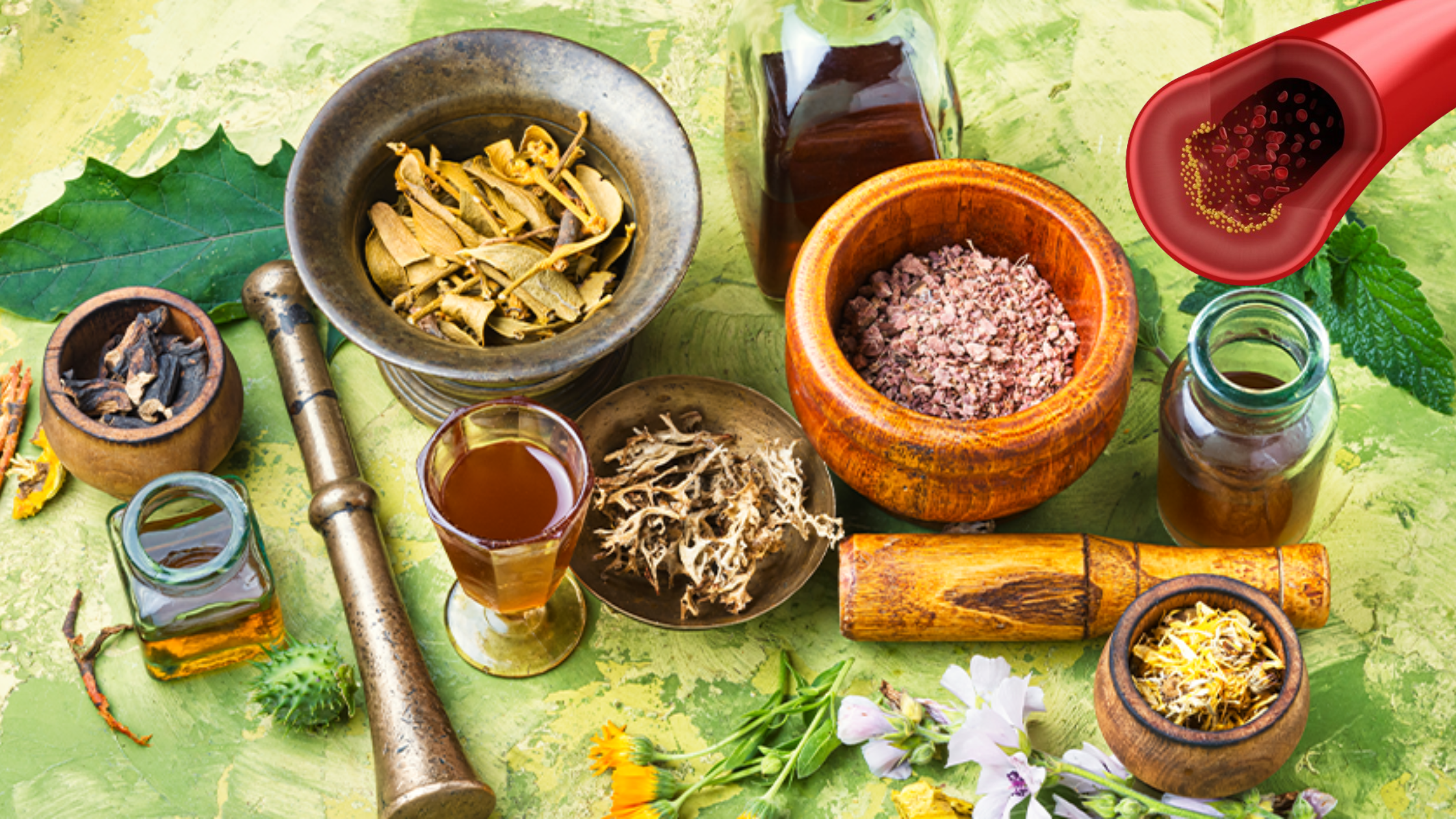Table of Contents
Introduction: Ayurvedic Medicine for Cholesterol
Cholesterol management is a crucial aspect of maintaining overall health and preventing cardiovascular diseases. While conventional treatments are commonly used, many individuals seek natural and holistic approaches to balance their cholesterol levels. Ayurvedic medicine, rooted in ancient wisdom and holistic principles, offers effective strategies for managing cholesterol levels naturally. In this article, we’ll explore the principles of Ayurveda in cholesterol management, including herbal remedies, dietary recommendations, lifestyle practices, and specialized therapies aimed at promoting cardiovascular health and overall well-being.
Understanding Cholesterol in Ayurveda:
In Ayurveda, cholesterol imbalance is viewed as a manifestation of doshic imbalances, particularly an accumulation of Kapha dosha. According to Ayurvedic principles, excessive consumption of heavy, oily, and sweet foods can lead to the accumulation of ama (toxins) in the body, contributing to high cholesterol levels. By understanding the root causes of cholesterol imbalance through an Ayurvedic lens, we can implement targeted remedies to balance doshas and support healthy lipid metabolism.
Causes of High Cholesterol According to Ayurveda:
Ayurveda identifies various factors contributing to high cholesterol, including dietary factors and lifestyle habits:
Dietary factors:
Consuming foods that are heavy, oily, and sweet can exacerbate Kapha dosha and lead to elevated cholesterol levels.
Lifestyle habits:
Sedentary behavior, stress, and irregular eating patterns can further aggravate doshic imbalances and contribute to high cholesterol. Addressing these underlying causes and making simple lifestyle changes can play a significant role in managing cholesterol levels and supporting cardiovascular health.
Ayurvedic Remedies for High Cholesterol:
Ayurveda offers a wealth of herbal remedies for balancing cholesterol levels and promoting cardiovascular health. Some of the most effective Ayurvedic remedies for high cholesterol include:
Guggul:
Known for its cholesterol-lowering properties, Guggul helps to reduce LDL (bad) cholesterol levels and increase HDL (good) cholesterol levels.
Arjuna:
A powerful cardio-protective herb, Arjuna helps to strengthen the heart, improve circulation, and lower cholesterol levels.
Triphala:
A combination of three fruits (Amalaki, Bibhitaki, and Haritaki), Triphala helps to detoxify the body, improve digestion, and regulate cholesterol levels. Incorporating these Ayurvedic remedies into the daily routine can support healthy lipid metabolism and cardiovascular function.
Lifestyle Practices for Healthy Lipid Profile:
In addition to herbal remedies, Ayurveda emphasizes the importance of lifestyle practices for maintaining a healthy lipid profile. Some key lifestyle practices for managing cholesterol and promoting cardiovascular health include:
Regular exercise:
Engaging in regular physical activity, such as brisk walking, yoga, or swimming, helps to improve circulation, lower cholesterol levels, and support overall cardiovascular health.
Stress management techniques:
Practicing relaxation techniques like meditation, deep breathing, and mindfulness reduces stress levels, which can negatively impact cholesterol levels and heart health.
Ayurvedic dietary guidelines:
Following a balanced diet rich in whole grains, fruits, vegetables, and healthy fats supports healthy lipid metabolism and cardiovascular function. By incorporating these lifestyle practices into the daily routine, individuals can support their cholesterol management efforts and promote overall cardiovascular wellness.
Ayurvedic Treatments for High Cholesterol:
For those seeking more intensive treatment, Ayurveda offers specialized therapies for managing cholesterol and promoting cardiovascular health. Panchakarma, a comprehensive system of detoxification therapies, includes treatments such as:
Basti (enema therapy):
Basti helps to cleanse the colon, remove ama (toxins), and balance doshas, supporting healthy lipid metabolism and cardiovascular function.
Udwarthanam (herbal powder massage):
Udwarthanam helps to improve circulation, reduce cholesterol levels, and promote overall cardiovascular health. These Ayurvedic treatments provide deep-seated support for managing cholesterol levels and restoring balance to the body, addressing the root cause of imbalances and promoting overall well-being.
Incorporating Ayurvedic Medicine into Daily Routine:
To maximize the benefits of Ayurvedic medicine for cholesterol management, it’s essential to integrate these remedies and practices into the daily routine consistently. By adopting a holistic approach to cardiovascular health and wellness, individuals can unlock the transformative power of Ayurveda and achieve improved cholesterol levels and overall well-being naturally and effectively.
Precautions and Considerations:
While Ayurvedic remedies are generally safe and well-tolerated, it’s important to consult with a qualified Ayurvedic practitioner before starting any new treatment regimen, especially if you have underlying health conditions or are taking medications. Additionally, some herbs and therapies may have contraindications or interactions with certain medications, so it’s crucial to seek personalized guidance to ensure safety and effectiveness.
Conclusion:
In conclusion, Ayurvedic medicine offers a holistic and effective approach to balancing cholesterol levels and promoting cardiovascular health. By addressing the root causes of cholesterol imbalance through herbal remedies, dietary recommendations, lifestyle practices, and specialized therapies, individuals can achieve improved lipid metabolism and overall cardiovascular wellness naturally and holistically. Embracing the wisdom of Ayurveda allows us to reconnect with our innate healing abilities and restore balance to the body, promoting optimal health and well-being.





